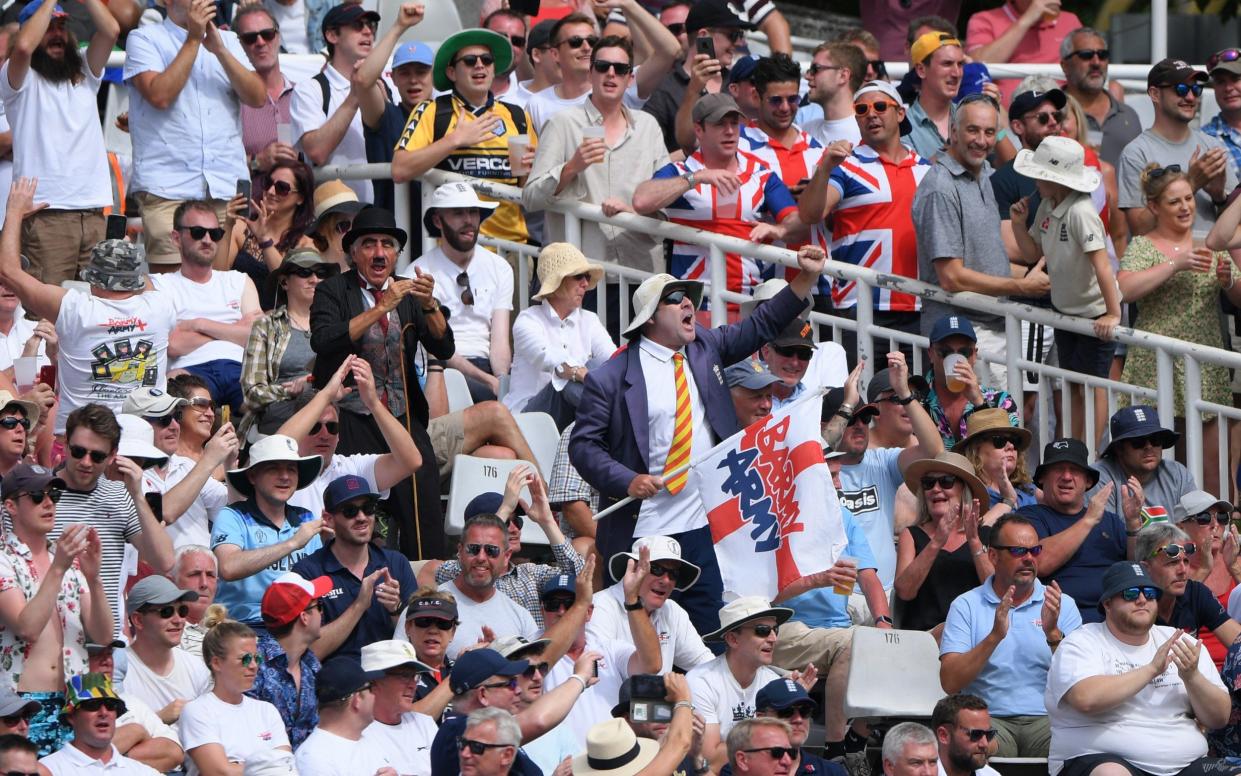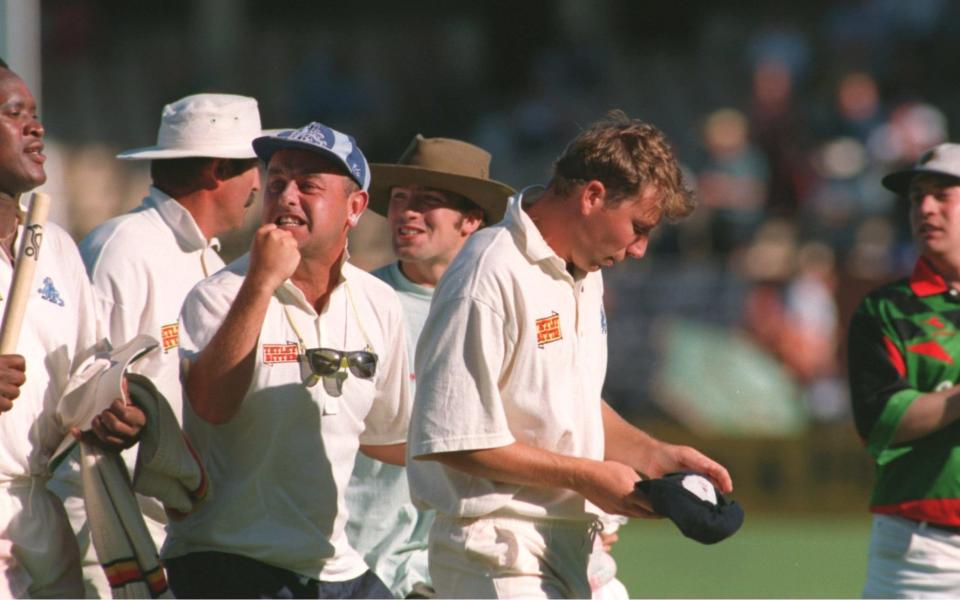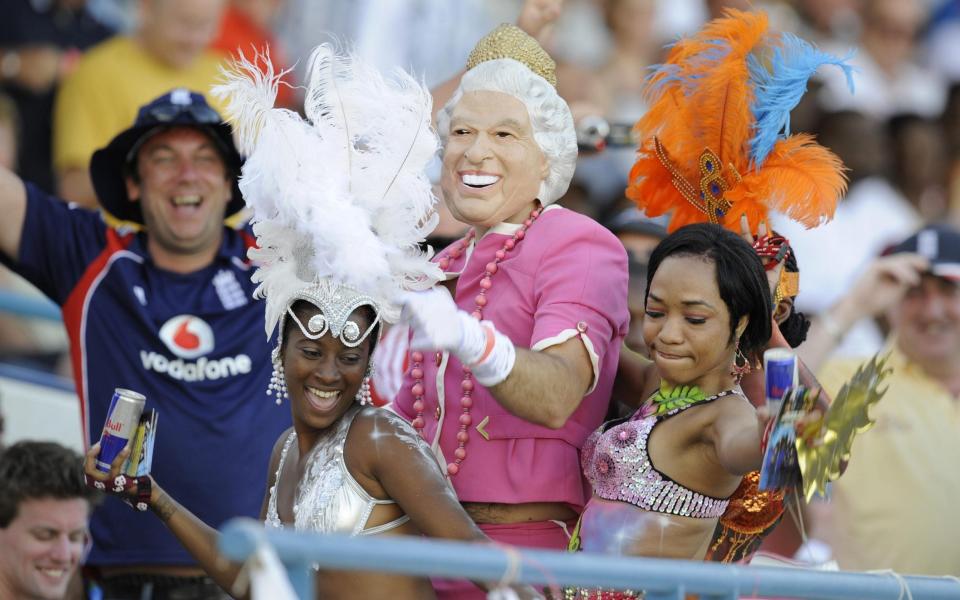The story behind the Barmy Army, England's travelling band of soused cricket fans

It is the lack of those insistent squalls and parps of trumpet which most mark the absence.
Everything else about the First Test of the 2021-2022 Ashes series has, with just two days gone, followed the cricket playbook. The hard, bright sunshine of an Australian summer. A fast, aggressive start from the home side. An England team visibly wilting in both the Queensland heat and the ferocity of their opponents’ attack. So far, so predictably standard. The visitors have won just one of the eight series to have been contested Down Under since 1987, and all the early indications suggest that the ninth – preparations for which, inevitably, have been stymied by Covid – will be a similarly flattening experience.
But England are also “competing” in Brisbane without another traditional element of any Ashes battle. Loyal support. Not least that vociferous, dedicated part of the fanbase which – brass instruments, face paint and beer to the fore – goes by the name “the Barmy Army”.
The reason for this non-attendance is obvious. Australia has some of the planet’s toughest pandemic border restrictions, and while allowing 18 players and support staff through the gate is one thing, holding it open for thousands of travelling spectators is another entirely.
Not that Joe Root or any of the England cricket hierarchy will blame the dropped catches and underwhelming batting of their performance so far on a dearth of applause from The Gabba galleries. This latest instalment of the Ashes – a near-140-year-old sporting rivalry that is always keenly fought, and frequently on acrimonious terms – was always likely to take place in such circumstances. There are no surprises here, and no excuses to be made.

But the gap in the stands where the Barmy Army normally spreads out its banners and flags will diminish the series nonetheless. As the empty seating, echoing terraces and pre-recorded chanting of pandemic-era football demonstrated all too well last year, live sport loses a good deal without the roar of the crowd. True, Australians are packed into The Gabba in number, and armed with all the enthusiasm that the prospect of another 5-0 beating of an old foe always brings. Yet without the gritted-teeth defiance and cheeky bonhomie of (quite) a few well-refreshed and sunburned “Poms”, it isn’t really the same.
Indeed, the Barmy Army was born of a chastening tour of Australia. In the last week of January 1995, an England team captained by Mike Atherton was already 2-0 down as it approached the Fourth Test of a series it would go on to lose. The gloom of defeats in Brisbane and Melbourne had been slightly lightened by a doughty draw in a Third Test that the visitors might have won, but as the bandwagon arrived in Adelaide for the Fourth Test, the overall result was all but decided. The stalemate in Sydney had ensured that Australia could not lose the five-match face-off, and, as holders, had already retained the Ashes urn. Few of those arriving in South Australia for the next chapter were expecting a team containing titans like Shane Warne and the Waugh brothers to concede any territory.
Maybe this fed the gallows humour of the touring support. Over the first two months of the series, the Australian media had been commenting, with a hint of baffled admiration, on the England supporters’ indefatigability of spirit – an indefatigability that certainly hadn’t been evident in the players in the First Test in Brisbane (where Australia had won by 184 runs) or the Second in Melbourne (where the margin of victory had increased to 295). And at some point, over a drink or five, someone – three men, David Peacock, Paul Burnham and Gareth Evans are credited as the founders – must have decided to make a virtue of this refusal to see sporting sense. During the lunch break of the Fourth Test’s first day, a small group of tourists took the sunny mile-long walk from Adelaide Oval – through Creswell Gardens, across the River Torrens, past the back of the Convention Centre – to the Downtown drag of Hindley Street. There, they halted at T-Shirt City, and ordered 50 tops bearing the legend “Atherton’s Barmy Army”. An idea was taking shape.

Perhaps they returned emboldened. Perhaps the new attire brought an extra volume to the songs and serenades – but back at the ground, England stirred. A dogged batting display saw the visitors reach 196-2 at the close of play, the captain making 80 – before his teammates continued to a total of 353 the following afternoon. Australia replied firmly, with a score of 419 for a first-innings lead of 66 – but when an unexpected salvo of 88 from pace bowler Phil DeFreitas helped England amass 328 runs in their second innings, the hosts were under pressure. Australia duly subsided to 156 all out in 61 overs, and a 106-run defeat, on the last day. Perhaps the “Barmy Army” were not so “barmy” after all.
Or perhaps they were. The Fifth Test in Perth returned to the well-worn grooves of the accepted sporting script, as Australia took their revenge by a cricketing chasm of 329 runs for an overall 3-1 triumph. Another decade would slip by before England tasted victory in an Ashes series, and 16 years before that success was sealed on Australian soil.
But the Barmy Army has endured. What began as a waggish joke in the first flushes of a mid-Nineties new year developed into something more substantial. Indeed, it had signed up fresh recruits before the bails were off in Adelaide – that initial purchase of 50 T-shirts had become 200 by the end of the Test. From there, the concept grew, in scope and scale, into the controlled circus which now rolls into grounds across the world – drums beating, trumpets blaring, “snakes” of discarded plastic pint glasses mushrooming in length on hazy afternoon terraces. Since 1995, the Barmy Army has marched into stadia in New Zealand, India, Pakistan, South Africa and across the Caribbean, as well as Australia. And it has set up camp at home. Almost every Test arena in England and Wales now puts aside a section of its seating for this loudest of backing bands, making summer matches in Nottingham, Manchester, Leeds, Cardiff and London as much carnivals as simple cricket.

Not everyone approves. The esteemed former Telegraph and Times journalist Christopher Martin-Jenkins tempered the euphoria that surrounded England’s first Ashes series win in 18 years by accusing the Barmy Army of “demeaning English cricket”. Barney Ronay of the Guardian went further when England followed that long-awaited 2-1 win in 2005 with a humiliating 5-0 capitulation Down Under barely a year later. “The Barmy Army are annoying,” he wrote – as the visitors succumbed by 277 runs during another First-Test thrashing in Brisbane. “It’s not as if we haven’t seen it all before. Large, sunburnt men attempt a slow-motion conga. Someone waves a crumpled flag. Depressed-looking people in funny costumes suddenly wake up and start punching the air on catching a glimpse of themselves on the big screen.” It was, he said, no longer a “laughing matter”.
The Barmy Army, as you might expect, disagrees with this. Its acolytes point out that it raises money for charity; that it brings a noisy, exuberant presence to grounds, but not the hostile behaviour that other sports can attract. Visitors to its website (barmyarmy.com) will note that it is part of the International Cricket Supporters’ Committee, which tries to give fans a voice in a global game – and that it offers easy access to match tickets and travel for its members. It has certainly helped to inject an air of youthful excitement into a sport that can be overly attracted to the sober silence of the pavilions and the posh seats.
Of course, there is room for both forms of devotion to a game that tends to make lifelong believers of its spectators. Not, admittedly, at Lord’s, its spiritual home, which remains the only English Test ground that refuses to find an official place for the Barmy Army – and not, as far as away fans are concerned, in Brisbane, Sydney, Adelaide, Melbourne or (to be confirmed) Perth over the next few weeks. But whatever the result in this latest Ashes collision, by the time New Zealand, India and South Africa fly into England for Test matches next summer, the Barmy Army’s soldiers will be back in position. Whatever your opinion of their antics, it is fair to say that the spectacle isn’t the same without them.
Join the Barmy Army in the Caribbean
The England cricket team’s next overseas tour will be of the West Indies, in January and March – including a three-match Test series (in Antigua, Barbados and Grenada) in the latter. Barmy Army membership (barmyarmy.com/membership) starts at £35 per year. Travel packages for the Caribbean are currently on sale at barmytravel.com. Among them are a 25-day break that takes in all three Tests, from £8,449 per person (including flights).

